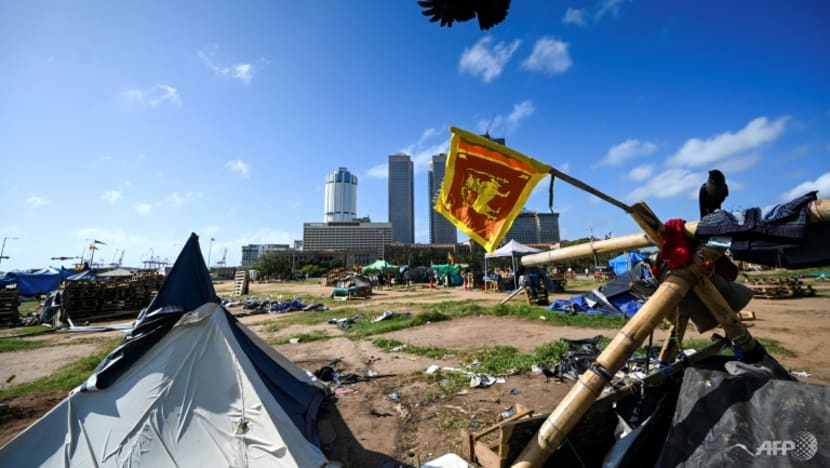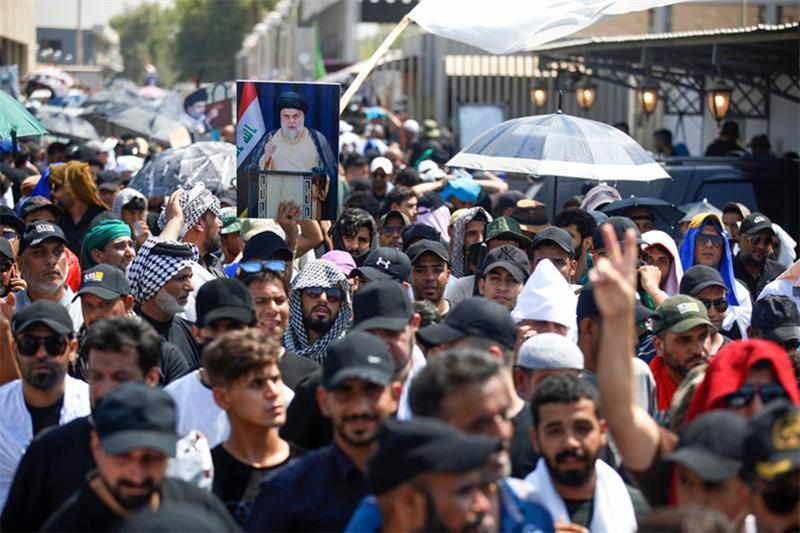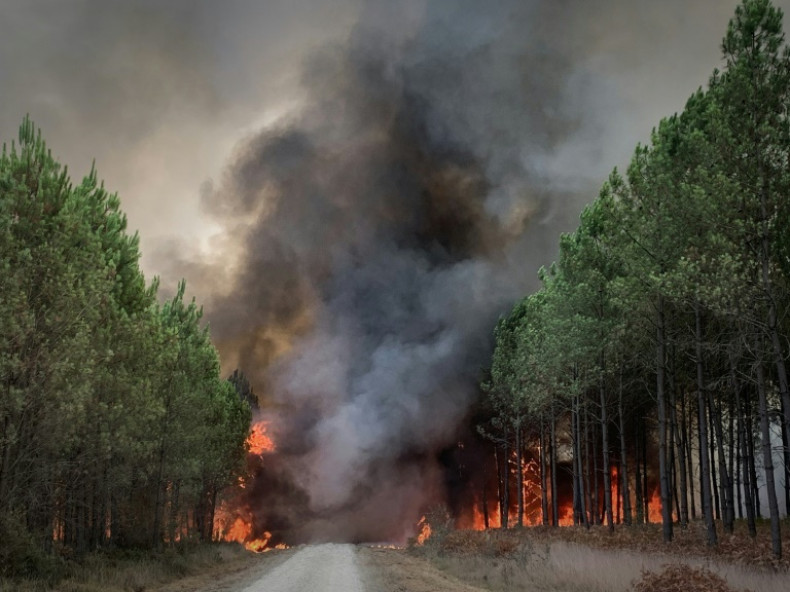
Japan's Prime Minister Fumio Kishida places a paper rose on an LDP candidate's name, in Tokyo
Tue, August 9, 2022
By Tim Kelly and Ju-min Park
TOKYO (Reuters) - Japan's Fumio Kishida is expected to reshuffle his cabinet on Wednesday, as his party's ties to the Unification Church have dented public support following the assassination of former premier Shinzo Abe last month.
Abe's suspected killer bore a grudge against the church, alleging it bankrupted his mother, and blamed Abe for promoting it, according to his social media posts and news reports.
Around a dozen other lawmakers from the ruling Liberal Democratic Party (LDP) have since disclosed connections to the church, which critics call a cult.
The church has confirmed the suspected gunman's mother was a member. It says it has been vilified and members have faced death threats since Abe's shooting.
Here's why the church is an issue.
WHAT'S THE BACKGROUND?
The Family Federation for World Peace and Unification, known as the Unification Church, was founded in South Korea in 1954 by Sun Myung Moon, an anti-communist and self-declared messiah.
Japan was one of the first destinations in its international expansion, where Moon's conservatism aligned with the Cold War views of the ruling elite.
He launched the International Federation for Victory Over Communism group in the 1960s, building relations with Japanese politicians, according to church publications.
WHY THE LDP?
The church and the LDP share some views, opposing same-sex marriage and supporting revision of Japan's pacifist constitution, said Eito Suzuki, a journalist who studies lawmakers' relationships with religious groups.
The church built ties with politicians to attract followers and gain legitimacy, said Hiro Yamaguchi, a lawyer who has worked on cases against it. Politicians gained access to church members for help with campaigns, he said.
The LDP had no "systematic relations" with the church, Secretary General Toshimitsu Motegi has said. It would cut off ties with the church, he said on Monday.
WHAT ABOUT ABE?
The church has said Abe was neither a member nor an adviser. He delivered a speech at an event hosted by a church affiliate last September, according to its website.
Nobuo Kishi, Abe's younger brother and the incumbent defence minister, told reporters he received support from church members as campaign volunteers.
Former prime minister Nobusuke Kishi, Abe's grandfather, was an honorary executive chair at a banquet hosted by Moon in 1974, the International Federation for Victory Over Communism said on its website.
FALL-OUT?
Support for Kishida's cabinet has fallen to the lowest since he took office in October at 46%, public broadcaster NHK said on Monday, with many poll respondents saying they wanted an explanation about ties to the church.
Kishida, who has said he has "no links" to it, said new cabinet members and new ruling party officials must "thoroughly review" ties with the church. [L1N2ZL04B]
BIG IN JAPAN?
The church has some 600,000 adherents in Japan out of 10 million globally, and Japan is the church's fourth-largest congregation, according to Ahn Ho-yeul, a Seoul-based spokesperson, although monitoring groups in Japan question the number.
Recruitment tactics include knocking on doors, targeting members' relatives and approaching people outside train stations, former followers say.
Japan has been its biggest source of income for decades, the spokesperson said, partly due to the practice of trading religious items for donations.
These so-called spiritual sales by the Unification Church and other groups have cost followers nearly $1 billion and resulted in some 35,000 compensation claims since 1987, according to a lawyers group.
The church previously pledged not to solicit excessive donations after some members were convicted of illegal sales tactics following an investigation.
The suspect in Abe's murder said the church persuaded his mother to part with around 100 million yen ($736,000), according to his social media posts and news reports.
After the incident, the church said it had returned around $400,000 to the mother. It denied coercing her or declined to comment on the total sum.
(Reporting by Tim Kelly in Tokyo and Ju-min Park in Seoul; Editing by John Geddie, David Dolan and Simon Cameron-Moore)
23 hours ago
Right-wing conservatives just can't help themselves by getting involved with religious cults. It's the standard ideological and psychological profile.
Batteries Not Included
19 hours ago
Go to Wikipedia and type in NOBUSUKE KISHI (Abe's grandfather) and you'll understand Japan's post WW 2 political mentality - thanks to the U.S. empathy towards fascism.
1 day ago
Religion is the poison of mankind! Remember the two who said that?

FILE PHOTO: Japan's Prime Minister Fumio Kishida delivers a speech at his official residence in Tokyo
Kiyoshi Takenaka and Elaine Lies
Mon, August 8, 2022
TOKYO (Reuters) -Japanese Prime Minister Fumio Kishida will reshuffle his cabinet on Wednesday paying attention to politicians' ties with the Unification Church, seeking to distance his administration from the controversial group and reverse a slump in opinion polls.
The reshuffle comes as Kishida's administration faces tumbling support rates. Public scrutiny of links between the group and ruling Liberal Democratic Party (LDP) lawmakers has increased markedly since former Prime Minister Shinzo Abe was gunned down last month at a campaign rally.
Abe was shot by a man whose mother is a member, and who told investigators he believed Abe had promoted the group to which his mother made ruinous donations, Japanese media have reported.
Kishida said on Tuesday that incoming new members of his cabinet and new ruling party officials must "thoroughly review" their ties with the group.
"It will be a pre-requisite," Kishida said, speaking at a news conference in Nagasaki.
Support for Kishida's cabinet has fallen to the lowest level since he took office last October, down to 46% from 59% three weeks ago, NHK public broadcaster said on Monday, results in line with other recent surveys. A vast majority of respondents said they want an explanation of politicians' ties to the Unification Church.
Kishida said in Nagasaki his cabinet needs reshuffling to deal with problems such as rising prices and an increasingly tense security environment.
"In many ways, we are facing the most critical situation since the end of World War Two," he said.
Industry Minister Koichi Hagiuda will be replaced by the former economy minister Yasutoshi Nishimura, Kyodo news reported later on Tuesday. Media reports said that Hagiuda will most likely replace the chairman of LDP's policy research committee Sanae Takaichi, who will be appointed economic security minister.
Former defence minister Yasukazu Hamada will replace the incumbent Nobuo Kishi, Abe's younger brother, while another former defence chief Taro Kono will enter the cabinet as the digital minister, Kyodo also reported.
Finance Minster Shunichi Suzuki will be retained, government and LDP sources told Reuters, declining to be named due to the sensitivity of the situation.
Foreign Minister Yoshimasa Hayashi and Economy Minister Daishiro Yamagiwa will also keep their posts, as will chief cabinet secretary Hirokazu Matsuno and LDP Secretary General Toshimitsu Motegi, media reports said.
One of Kishida's advisers, Minoru Terada, and upper house lawmaker Naoki Okada, are expected to be appointed to the cabinet for the first time, the Yomiuri added, without specifying their positions.
The reshuffle had been expected to take place in early September, but analysts said Kishida appears to be moving early to try to halt the slide in his support as soon as possible. .
Though his ratings are also being hit by COVID-19 cases recently surging to record highs, the main issues voiced in opinion surveys are public unhappiness with the idea of a state funeral for Abe, Japan's longest-serving premier but a polarising force in the country, along with the Unification Church connections.
"His cabinet lineup will show that the LDP is taking tough measures to deal with what is now mostly a problem of individuals before it taints the whole party," said Airo Hino, a professor at Waseda University.
"The Unification Church problem is something he doesn't want to drag on."
(Additional reporting by Yoshifumi Takemoto, David Dolan and Kantaro Komiya; writing by Elaine Lies; Editing by Sam Holmes, Stephen Coates, Kenneth Maxwell and Raju Gopalakrishnan)

Japan's Prime Minister Fumio Kishida, front center, and his cabinet ministers attend a photo session at Kishida's residence Wednesday, Aug. 10, 2022, in Tokyo. (Issei Kato/Pool Photo via AP)
MARI YAMAGUCHI
Tue, August 9, 2022
TOKYO (AP) — Japanese Prime Minister Fumio Kishida reshuffled his Cabinet on Wednesday in an apparent bid to distance his administration from the conservative Unification Church over its ties to the assassinated leader Shinzo Abe and senior ruling party members.
The reshuffle, second in just 10 months since Kishida took office, followed his July election victory that had been expected to ensure long-term stability until 2025. But Abe’s shocking assassination on July 8 and its impact on politics increased uncertainty as public support for Kishida’s Cabinet plunged.
Kishida said it was important to gain people's trust and that the new Cabinet included only those who agreed to strictly review their ties to the church and help the victims of the allegedly fraudulent religious businesses.
“We have to be careful about our relationship with an organization that has known social problems so that they won't raise suspicions among the public,” Kishida said.
A survey released Monday by the NHK public television showed support for Kishida’s Cabinet fell to 46% from 59%.
Most of the respondents said they think politicians have not sufficiently explained their ties to the Unification Church. Kishida’s plan to hold a state funeral for Abe has also split public opinion because of Abe’s archconservative stance on national security and wartime history.
“The Cabinet reshuffle was damage control” to divert the public’s attention from the Unification Church scandal, political analyst Atsuo Ito told a TBS talk show.
Abe was fatally shot while giving a campaign speech two days before the parliamentary election. Police and media reports say the suspect targeted Abe over suspected ties to the Unification Church, which the man hated because his mother’s massive financial donations to the church ruined his family.
Abe, in his video message to the church affiliate the Universal Peace Foundation, in September 2021, praised its work toward peace on the Korean Peninsula and its focus on family values. Some experts say Abe's video appearance may have motived the suspect.
The ties between the church and Japan’s governing party go back to Abe’s grandfather, Nobusuke Kishi, who served as prime minister and shared U.S. concerns over the spread of communism in Japan in the 1960s.
The church since the 1980s has faced accusations of devious recruitment and brainwashing of its adherents into making huge donations. Critics say the church has contributed votes to lift borderline candidates to election victories, while allegedly pushing their opposition to equal rights for women and sexual minorities to be reflected on government policies.
On Wednesday, Tomihiro Tanaka, president of the church, which now calls itself the Family Federation for World Peace and Unification, told a news coference that the church-related UPF that Abe was linked to is more politically active and involved in election campaigns.
But he denied any “political interference” with specific parties and said that Kishida's call for his party members to distance themselves from the church was “regrettable.”
Tanaka said the church and its affiliate groups have naturally developed closer ties with the Liberal Democratic Party conservatives than others because of their shared anti-communist stance.
“We've worked together with politicians who have clear views against communism in order to build a better country," Tanaka said. “We are pursuing the activity not only in Japan but as part of our global network against communism.”
Kishida denied the church's “inappropriate influence” on government policies.
Chief Cabinet Secretary Hirokazu Matsuno, who retained his post, announced the new Cabinet, including five ministers who kept their posts, another five who were brought back and nine first-timers.
Seven ministers who acknowledged their ties to the church were removed. They include Defense Minister Nobuo Kishi, Abe's younger brother, who said that church followers were volunteers in his past election campaigns, and Public Safety Commission Chairman Satoshi Ninoyu, who attended an event organized by a church-related organization.
Several newly appointed ministers said they had given donations and had others links to the church in the past, triggering criticism from opposition leaders.
Japanese Communist Party senior lawmaker Akira Koike said the reshuffle failed to cover up the Unification Church ties. “It only showed the LDP’s deep ties to the church because they cannot form a Cabinet if they exclude lawmakers linked to the church.”
Kishida said the main purpose of the reshuffle was to “break through one of biggest postwar crises” such as the coronavirus pandemic, inflation, growing tensions between China and self-ruled Taiwan and Russia’s war on Ukraine. He said that bolstering Japan’s military capability and spending was a top priority.
Kishi was replaced by former Defense Minister Yasukazu Hamada, and Taro Kono, who previously served as a vaccination tsar during the pandemic as well as foreign and defense minister, returned to the Cabinet as digital minister.
Along with Matsuno, Foreign Minister Yoshimasa Hayashi, Economy Minister Daishiro Yamagiwa, Transportation Minister Tetsuo Saito, Finance Minister Shunichi Suzuki also kept their jobs.
Economy and Trade Minister Koici Hagiuda, who also had church ties, was shifted to head the party policy research committee and replaced by former Economy Minister Yasutoshi Nishimura. Katsunobu Kato was appointed health minister for the third time, tasked with coronavirus measures.
The new Cabinet suggested Kishida tasked veterans with key portfolios such as diplomacy, defense, economic security and pandemic measures while carefully keeping a power balance among party wings to solidify unity amid growing speculation of a power struggle within Abe's faction.
Despite criticism that Japanese politics is dominated by older men, the majority of the Cabinet members are still men older than 60, with only two women.
They include Sanae Takaichi, an ultra-conservative close to Abe who was appointed economic security minister, and Keiko Nagaoka, a first-timer who became education minister and replaced Shinsuke Suematsu, who also acknowledged his Unification Church links.
Gender Minister Seiko Noda, who admitted to sending a message to a church-related group’s event in 2001 that was attended by her aide, was replaced by Masanobu Ogura in his first Cabinet post.












